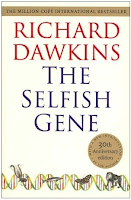I did another marathon reading of Dawkins this weekend, completing The Selfish Gene at 3 AM this morning. I could have finished sooner, but I procrastinated heavily on Sunday. Shockingly—at least to me—I seriously considered throwing away my goal. Somehow, I pushed through the actual physical pain of my brain being packed with so much information in such a short time span. I am very proud of myself, and I am so glad I didn’t try to justify not following through with what I originally intended.
I recommend this book to everyone. It’s not as easily understood as it claims, but it’s not as big of a trick as Einstein’s Relativity. The Selfish Gene isn’t capable of anything less than benefiting the human mind, no matter the amount of The Selfish Gene's detailed information it absorbs.
Science made easy by metaphors; Dawkins finest quality as a writer. It’s easy to see after reading The Selfish Gene why it’s widely considered his “crown jewel,” but my favorite remains The Greatest Show on Earth. If I could have a love affair with a published work, The Greatest Show on Earth would be my dirty little secret.
I recommend this book to everyone. It’s not as easily understood as it claims, but it’s not as big of a trick as Einstein’s Relativity. The Selfish Gene isn’t capable of anything less than benefiting the human mind, no matter the amount of The Selfish Gene's detailed information it absorbs.
Science made easy by metaphors; Dawkins finest quality as a writer. It’s easy to see after reading The Selfish Gene why it’s widely considered his “crown jewel,” but my favorite remains The Greatest Show on Earth. If I could have a love affair with a published work, The Greatest Show on Earth would be my dirty little secret.
This Week's Book: The Selfish Gene: 30th Anniversary Edition by Richard Dawkins
Chapter 3: “Immortal coils”
It is its potential immortality that makes a gene a good candidate as a basic unit of natural selection. But now the time has come to stress the word ‘potential’. A gene can live for a million years, but many new genes do not even make it past their first generation. The few new ones that succeed do so partly because they are lucky, but mainly because they have what it takes, and that means they are good at making survival machines. . . . Conversely, what are the properties that instantly mark a gene out as a ‘bad’, short-lived one? There might be several such universal properties, but there is one that is particularly relevant to this book: at the gene level, altruism must be bad and selfishness good. This follows inexorably from our definitions of altruism and selfishness. Genes are competing directly with their alleles for survival, since their alleles in the gene pool are rivals for their slot on the chromosomes of future generations. Any gene that behaves in such a way as to increase its own survival chances in the gene pool at the expense of its alleles will, by definition, tautologously, tend to survive. The gene is the basic unit of selfishness. (Page 36)
—————
Chapter 3: “Immortal coils”
As an aside, one of the good features of this theory is that it leads us to some rather interesting speculations. For instance it follows from it that if we wanted to increase the human life span, there are two general ways in which we could do it. Firstly, we could ban reproduction before a certain age, say forty. After some centuries of this the minimum age limit would be raised to fifty, and so on. It is conceivable that human longevity could be pushed up to several centuries by this means. I cannot imagine that anyone would seriously want to institute such a policy.
Secondly we could try to ‘fool’ genes into thinking that the body they are sitting in is younger than it really is. In practice this would mean identify changes in the internal chemical environment of a body that take place during ageing. Any of these could be the ‘cues’ that ‘turn on’ late-acting lethal genes. . . . (Page 41)
—————
Chapter 10: “You scratch my back, I’ll ride on yours”
A long memory and a capacity for individual recognition are well developed in man. We might therefore expect reciprocal altruism to have played an important part in human evolution. Trivers goes so far as to suggest that many of our psychological characteristics—envy, guilt, gratitude, sympathy etc.—have been shaped by natural selection for improved ability to cheat, to detect cheats, and to avoid being thought to be a cheat. Of particular interest are ‘subtle cheats’ who appear to be reciprocating, but who consistently pay back slightly less than they receive. It is even possible that man’s swollen brain, and his predisposition to reason mathematically, evolved as a mechanism of ever more devious cheating, and ever more penetrating detection of cheating in others. Money is a formal token of delayed reciprocal altruism. (Pages 187-188)
Books read this past week...
★★★★★ Alice's Adventures in Wonderland/Through the Looking-Glass by Lewis Carroll
★★★★★ The Selfish Gene: 30th Anniversary Edition by Richard Dawkins
(All title links link back to my webpages of them on Goodreads.com, a great library/reviewing/rating website for readers. Check it out, and add me as a friend if you decide to join!)










No comments:
Post a Comment